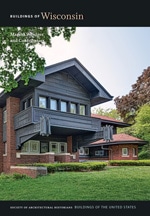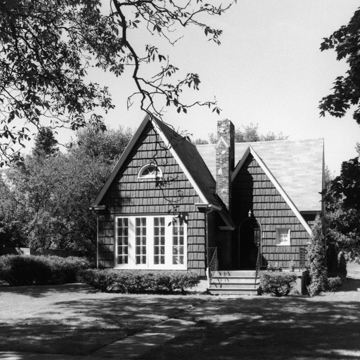Between 1908 and 1940, Americans turned to the Sears, Roebuck catalogs to buy clothing, farm tools, furniture, appliances, and much more. Sears also provided houses, advertised in its Book of Modern Homes and Building Plans, which offered more than 450 ready-to-assemble designs in fashionable styles. More than one hundred thousand American families ordered their houses from Sears, which shipped the parts by rail. Sometime between 1935 and 1939, Martin Roumm ordered the Mitchell, marketed by Sears as “the latest idea in English architecture with a touch of the popular California studio type.” Wooden shingles clad the unpretentious house, which is sheltered by a cross-gabled roof. At the entrance portal, one of the eaves slopes almost to the ground, in picturesque fashion. A bank of multipaned windows lights the living room, and a semicircular fanlight graces the attic. As a finishing touch, “a quaint English lamp,” according to the catalog, “bespeak[s] the hospitality and happiness that dwell within.”
You are here
Martin Roumm House
If SAH Archipedia has been useful to you, please consider supporting it.
SAH Archipedia tells the story of the United States through its buildings, landscapes, and cities. This freely available resource empowers the public with authoritative knowledge that deepens their understanding and appreciation of the built environment. But the Society of Architectural Historians, which created SAH Archipedia with University of Virginia Press, needs your support to maintain the high-caliber research, writing, photography, cartography, editing, design, and programming that make SAH Archipedia a trusted online resource available to all who value the history of place, heritage tourism, and learning.















